
Google December Core Update 2020: What We Know So Far

Get helpful updates in your inbox
Update December 17, 2020: Google announced yesterday at 2pm ET that the December 2020 Core Update has finished rolling out.
Ah, yes. Nothing says “Happy Holidays’ like Google SearchLiaison confirming the rollout of the December Core Update.
Later today, we are releasing a broad core algorithm update, as we do several times per year. It is called the December 2020 Core Update. Our guidance about such updates remains as we’ve covered before. Please see this blog post for more about that:https://t.co/e5ZQUAlt0G
— Google SearchLiaison (@searchliaison) December 3, 2020
And in typical Google fashion, they refer publishers to their 2019 blog titled what webmasters should know about Google’s core updates. Additionally, for publishers who want to understand how to best weather these algorithm changes, Google directs them to the 2011 blog called more guidance on building high-quality sites.
Google’s advice has remained unchanged on how to build high-quality sites since 2011, so we wrote a blog breaking down each piece of Google’s guidance step-by-step.
So what changes have the Google December Core Update brought so far? Let’s take a look.
This blog was updated on December 11, 2020
What do we know about the Google December Core Update?
Right now, we don’t know that much.
As per usual, there are hundreds of replies to SearchLiaison’s tweet with claims of how their website(s) were or were not affected.
This screenshot from BlackHatWorld is a great example of how varied these claims can be after a Google Core update.
These comments are all within minutes of each other. One publisher says they saw no changes, the next said the update affected them negatively, and the last said they saw a “major boost” in their traffic.
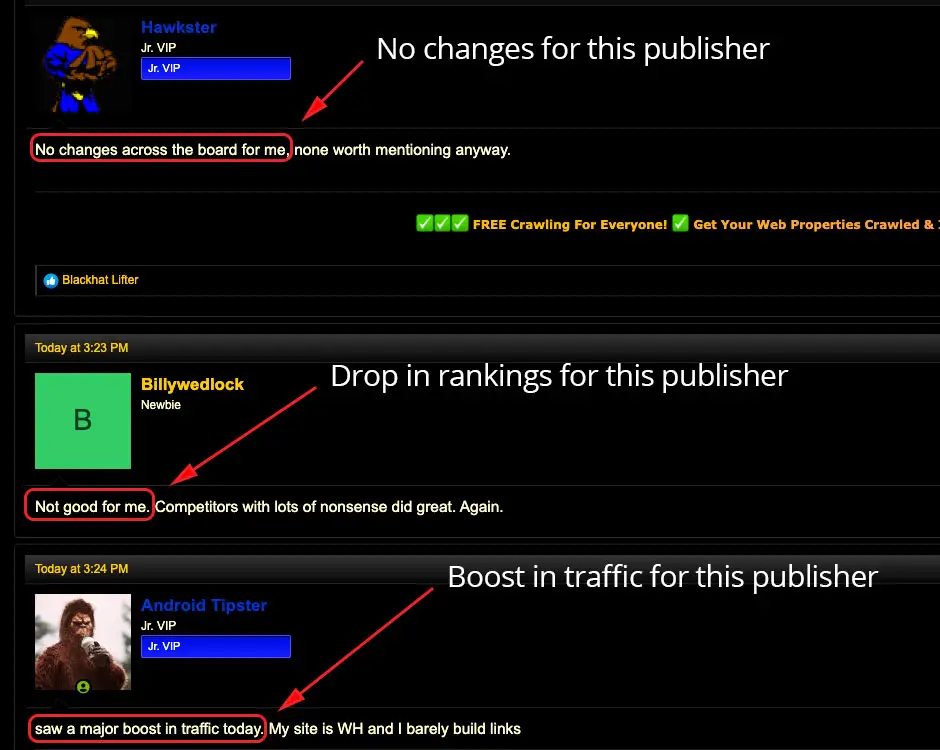
These comments are reflective of what happens online post-core updates—social media and online forums become rumor mills, with little-to-no objective evidence of if any of these changes were caused by a core update.
Many publishers on Twitter claim that with each new update, oftentimes there is a “reversal” effect. Meaning that if certain sites or niches were hit in May’s core update, the effect may be “reversed” in this update from Google balancing things out.
While there is no proof of this phenomenon occurring, it’s mentioned frequently enough to take notice of. Plus, it just makes more sense that websites won’t be affected the same way every update. Could you imagine if every single core update your traffic dropped? That would make it incredibly tough to grow a website if that happened unless Google recalibrated things. Even outside of Core updates, Google makes thousands of tweaks to their algorithm per year that go unannounced.
Some publishers think sitemaps could be related to this Google core update
The quoted Tweet below shows that John Mueller of Google tweeted a question about sitemaps the day before the core update.
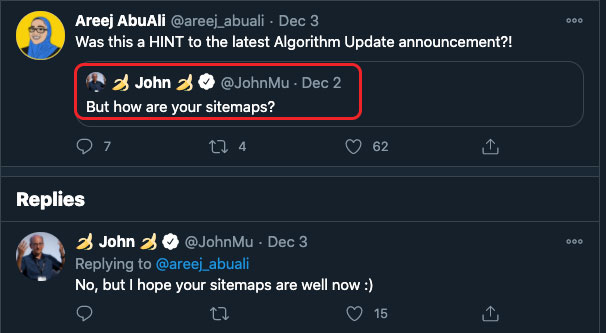
John M. responded to this tweet saying that it was not a “hint.”
There were also others that complained of indexing issues around the same time as the update. This Twitter user was wondering if what was happening around the update was another indexing bug. In mid-October, Google had an indexing bug that affected a tiny percentage of URLs.
@rustybrick have there been any rumours of another indexing bug? Because I am certainly seeing the symptoms of one in the past couple of days.
— Tom Crewe (@TomCrewe) December 4, 2020
John responded that there weren’t any indexing issues, and reiterated that Google does not index every single page on a website. In many of these other interactions, John pointed toward making sure your website’s sitemaps are set up properly. Since these play a big role in how Google crawls your website.
Do sitemaps matter?
In short, yes. Sitemaps matter. But more importantly, what are they?
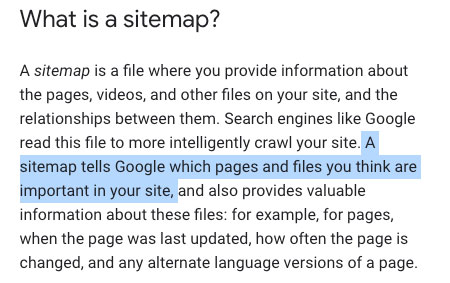
A sitemap is essentially a roadmap that allows Google to ‘intelligently’ crawl your site. It provides valuable information about the files on your site. For example, for pages, that would mean when the page was last updated, how often the page is changed, and any alternate language versions of a page.
Most publishers use plugins or tools that crawl their website and create a sitemap, then the publisher uploads it.
This Twitter user tweeted a link to a Google blog about sitemaps, that John Mueller liked.
Found this Google Search guide by @googlesearchc ?
Large site owner’s guide to managing your crawl budget: https://t.co/RWru0IPTtk
Guide for site owners with:
? Large sites (1 million+ unique pages)
?10,000+ unique pages that change dailyNo new info but interesting ?.
— Adam Gent (@Adoubleagent) December 1, 2020
Additionally, Google Search Central provides a guide on how to build sitemaps.
While it doesn’t seem sitemaps are related to the December Core Update, those at Google seem to be emphasizing the importance of them. So it’s probably a good idea to ensure that yours are set up properly.
How the Google December Core Update affected Ezoic publishers
Now that it’s been a week since the update, we’ve gathered some data on whether the core update affected Ezoic publishers.
The data was aggregated from 12,000 Ezoic publishers’ search console data. Overall, post core update we saw a positive uplift for Ezoic publishers.
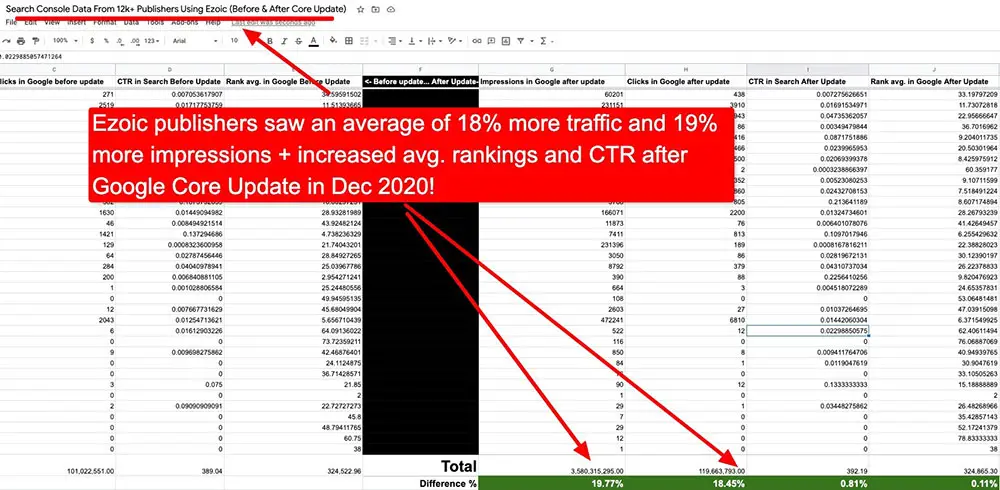
Ezoic publishers saw an average of 18% more traffic and 19% more impressions than the days prior to the update.
Additionally, click-through-rate and average rank increased marginally (<1%) across most domains.
Past core updates and how they affected publishers
In 2020, there has been 3 total core updates. Before the December update, there were two. The May core update and the January core update.
May core update
The May core update was primarily focused on Google adapting to changes in search behaviors due to Coronavirus
Google Search has never seen as many searches for a single topic continue over a sustained period as is happening now with COVID-19. Many searches are for news about what’s happening in local areas, such as sheltering updates or the latest on testing. Here’s how we’re helping….
— Google SearchLiaison (@searchliaison) May 4, 2020
One of these changes was that Google put a bigger emphasis on helping users find local news in their area.
“Local news can be material produced by publishers like local newspapers, that we understand specifically serve particular cities or regions. It can also be content we identify as relevant to a particular area, even if written by those outside the area.” —Google
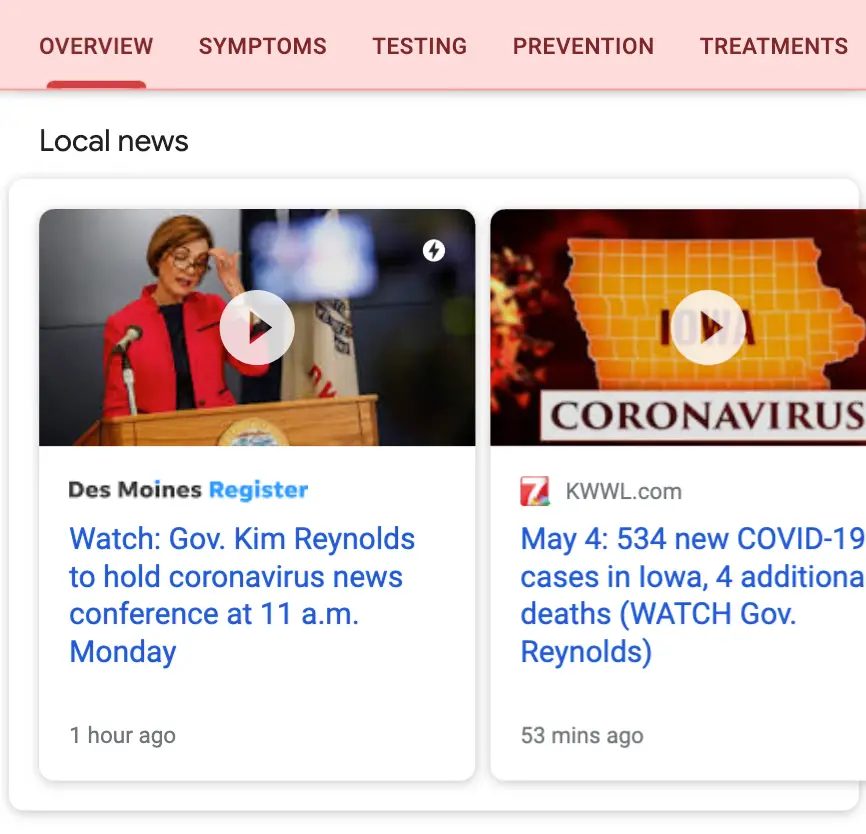
In addition to some of these changes, it was very clear from the impact that this update had on certain publishers that Google was testing results on SERPs very rapidly. Many people experienced major fluxes in their traffic.
January core update
The January core update seemed to affect affiliate websites the most. Many in the industry saw non-affiliate websites get a boost.
Some in digital publishing attribute this to increased capabilities of Google’s BERT natural language processing.
John Mueller also responded to some re-emphasizing the importance for affiliate websites to use rel=sponsored for affiliate links.
Wrapping up the December core update from Google
As always, our advice is the same. When Google rolls out a new core update, the absolute best thing you can do as a publisher is to not change your site.
This way, if you do experience an organic loss (or growth) in traffic, you will be able to attribute the cause to the update.
On the other hand, if you are changing your site to “fix” a possible drop in traffic from the rollout you will never know if your changes are helping, hurting, or making no difference because the updates rollout and change over the weeks following Google’s announcements
In the coming weeks, we will update this article with data if we see any specific trends with who has (or hasn’t) been affected by the update.
Have you seen any sudden changes in your traffic or rankings since the December Core Update? Let us know in the comments.

Allen is a published author and accomplished digital marketer. The author of two separate novels, Allen is a developing marketer with a deep understanding of the online publishing landscape. Allen currently serves as Ezoic's head of content and works directly with publishers and industry partners to bring emerging news and stories to Ezoic publishers.
Featured Content
Checkout this popular and trending content

Ranking In Universal Search Results: Video Is The Secret
See how Flickify can become the ultimate SEO hack for sites missing out on rankings because of a lack of video.
Announcement

Ezoic Edge: The Fastest Way To Load Pages. Period.
Ezoic announces an industry-first edge content delivery network for websites and creators; bringing the fastest pages on the web to Ezoic publishers.
Launch

Ezoic Unveils New Enterprise Program: Empowering Creators to Scale and Succeed
Ezoic recently announced a higher level designed for publishers that have reached that ultimate stage of growth. See what it means for Ezoic users.
Announcement
